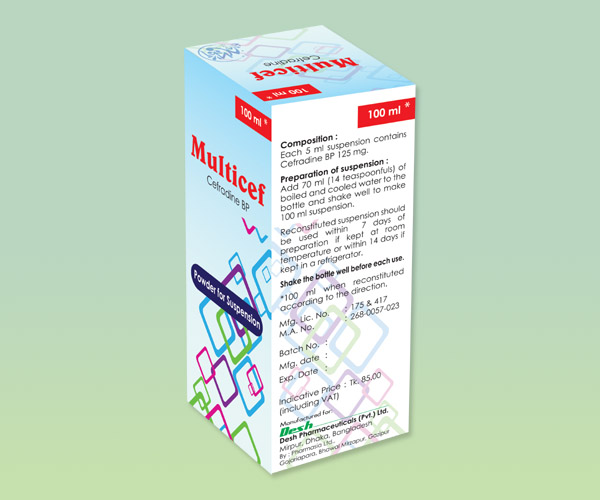Multicef-PFS
Cefradine 125 mg/ 5ml
Multicef-PFS
Cefradine 125 mg/ 5ml
Description
Multicef (Cefradine) is a cephalosporin antibiotic with broad spectrum bactericidal activity against both gram-positive and gram-negative bacteria. It is also highly active against most strains of penicillinase producing Staphylococci. The organisms sensitive to Cefradine are:
Gram-positive: Staphylococci (both penicillin sensitive and resistant strains), Streptococci including both Streptococcus pyogenes (beta hemolytic) and group D Streptococci (Enterococci) and Streptococcus pneumoniae.
Gram-negative: E. coli, Klebsiella, P. mirabilis, Haemophilus influenzae, Shigella sp. (including Salmonella typhi) and Neisseria species. Enterococci (S. faecalis) and many strains of E. coli and Staphylococcus aureus are also susceptible.
Multicef (Cefradine) is rapidly absorbed from the gastrointestinal tract. Absorption is delayed by presence of food although the total amount absorbed is not appreciably altered.
- AVAILABILITY: AVAILABLE
Composition
Multicef Powder for Suspension: After reconstitution each 5ml suspension contains Cefradine BP 125 mg.
Indication
Multicef (Cefradine) is used in the treatment of infections caused by sensitive organisms.
Upper respiratory tract infections: Pharyngitis, sinusitis, otitis media, tonsillitis, laryngotrachyobronchitis.
Lower respiratory tract infection: Acute and chronic bronchitis, lobar and bronchopneumonia.
Urinary tract infections: Cystitis, urethritis, pyelonephritis.
Skin and soft tissue infections: Abscess, cellulites, furunculosis, impetigo.
Gastrointestinal tract infections: Bacillary dysentery, enteritis, peritonitis.
Bone and joint infection.
Surgical prophylaxis: It is also used in perioperative prophylactic administration (pre-operatively, intra-operatively and post-operatively). In cesarean section, intra-operative (after clamping the umbilical cord) and post-operative use may reduce the incidence of certain post-operative infections.
Dosage and administration
The dosage may be given without regard to meals.
Adult: The usual dose is 1-2 g daily in 2 to 4 divided doses. In severe and prolonged infection, the dose can be increased up to 4 g daily which should be taken in equally divided doses.
Special dose in the following infections:
Skin and skin structures and respiratory tract infection: Usual dose is 250 mg every 6 hours or 500 mg every 12 hours.
Lobar pneumonia: 500 mg every 6 hours or 1 g every 12 hours.
Urinary tract infection: Usual dose is 500 mg every 12 hours.
Gastrointestinal tract infection: 500 mg three to four times daily.
Children: The usual total dose is 25 to 50 mg/kg/day given in 2 to 4 equally divided doses.
Perioperative prophylaxis: Recommended dose is 1-2 g by intramuscular or intravenous route; subsequent parenteral or oral doses are given as appropriate.
Therapy should be continued for a minimum of 48-72 hrs. after the patient becomes asymptomatic or evidence of bacterial eradication has been obtained.
Dosage in renal impairment: In patients with impaired renal function, doses and frequency of administration of Cefradine must be modified according to the degree of impairment, severity of infection, susceptibility of the causative organism and serum concentration of the drug. For adults, a loading dose of 750 mg should be given subsequently followed by 500 mg with the mentioned time interval.
|
Creatinine clearance (ml/min.) |
Time interval (hrs.) |
|
> 20 |
6-12 |
|
15 - 19 |
12-24 |
|
10 - 14 |
24-40 |
|
5 - 9 |
40-50 |
|
< 5 |
50-70 |
For children, dosage schedule may need to be adjusted.
Reconstitution
Multicef Suspension: For the Suspension, shake the bottle well before adding water, and then add 60 ml (with the help of provided spoon, 12 spoonfuls) of boiled and cool water to the bottle. Then continue shaking the bottle gently until the granules disperse properly.
Multicef Pediatric Drops: Shake the bottle well before adding water. Then add 10 ml (with the help of provided spoon, 2 spoonfuls) of boiled and cool water. Then continuously shake the bottle well until the granules disperse properly.
Side effects
Side effects include nausea, vomiting, diarrhea and abdominal discomfort. Allergic reactions including skin rashes, urticaria, eosinophilia, angioedema and anaphylaxis may occur and elevation of hepatic enzyme values have been noted. Neutropenia has been reported. Super-infection with resistant microorganisms, particularly candida, may follow the treatment. There is also a possibility of development of pseudomembranous colitis. Precaution
Cefradine should be used with caution in those patients who are known hypersensitive to penicillins.
Use in pregnancy and lactation
Although there have been no report of adverse effect on the fetus, safety of use during pregnancy has not been definitely established. The drug should be used during pregnancy only when clearly indicated. Cephalosporins are distributed into breast milk and the drug should be used with caution in nursing women.
Contraindication
It should not be used in patients hypersensitive to any cephalosporin antibiotic.
Pharmaceutical precaution
Multicef capsule, bottles of suspension and drops should be kept in a cool and dry place, protected from light and moisture. The reconstituted suspension and pediatric drops should be used within 7 days of preparation if kept at room temperature or within 14 days if kept in a refrigerator. Keep out of reach of children. Shake the bottle well before each use.
Packing
Multicef Powder for Suspension: Bottle containing dry granules to reconstitute 100 ml Suspension.
